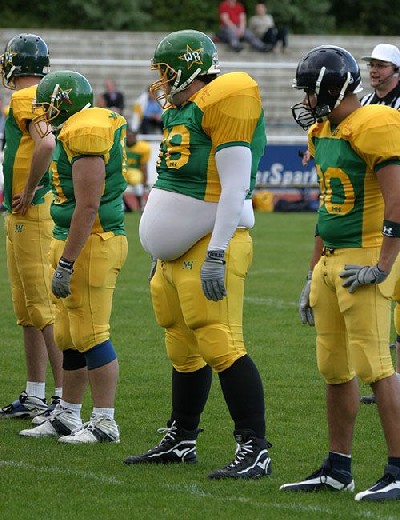oldfartvol
Well-Known Member
- Joined
- Aug 10, 2010
- Messages
- 1,290
- Likes
- 449
It seems the trend in college football over the last few years is to recruit jumbo offensive lineman (320 lbs. plus).
In MHO, I would rather have a smaller OL (270-295 lbs.)if they can achieve similar strength in the weight room.
I am of the opinion that once a player reaches a certain size there is no advantage in getting heavier. In fact, I think adding 40-50 lbs. of blubber has many disadvantages:
1. Carrying the extra weight is like playing with a weight belt around your waste. It only increases the fatigue factor over the course of the game.
2. Smaller linemen would be better able to fire off the LOS and make contact with the D lineman instead of having them blow by virtually untouched.
3. A smaller OL would be able to pull and make critical blocks on the corners and get to the second level and engage the linebackers, which would allow our RB's to break away for some long runs.
4. Without the extra fat, our OL would be less injury prone (especially knees and ankles).
I would have our guards weigh in at around 270 and our OT's at around 295 lbs. or so.
What do ya'll think VN? Good logic or am I alone on this island by myself?:compute:
In MHO, I would rather have a smaller OL (270-295 lbs.)if they can achieve similar strength in the weight room.
I am of the opinion that once a player reaches a certain size there is no advantage in getting heavier. In fact, I think adding 40-50 lbs. of blubber has many disadvantages:
1. Carrying the extra weight is like playing with a weight belt around your waste. It only increases the fatigue factor over the course of the game.
2. Smaller linemen would be better able to fire off the LOS and make contact with the D lineman instead of having them blow by virtually untouched.
3. A smaller OL would be able to pull and make critical blocks on the corners and get to the second level and engage the linebackers, which would allow our RB's to break away for some long runs.
4. Without the extra fat, our OL would be less injury prone (especially knees and ankles).
I would have our guards weigh in at around 270 and our OT's at around 295 lbs. or so.
What do ya'll think VN? Good logic or am I alone on this island by myself?:compute:
Last edited:




